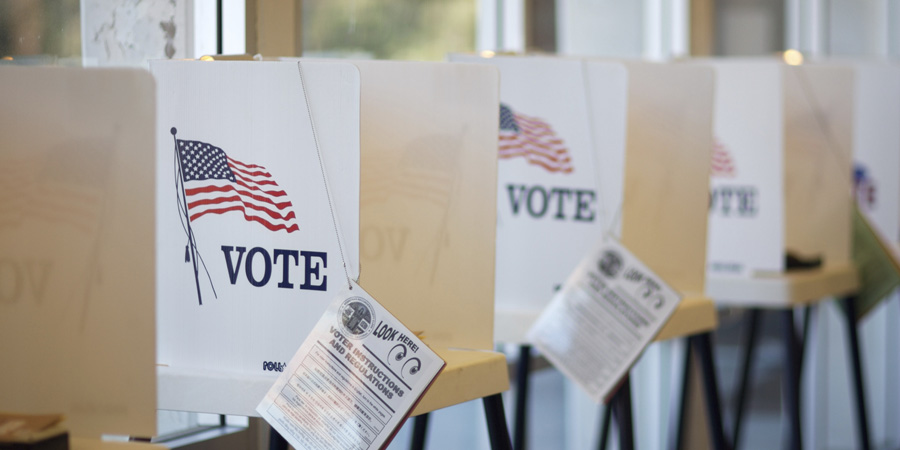How will a Trump or Clinton win impact global markets?
by Marina Pomerantz, Portfolio Manager, Trimark Investments, Invesco Canada
Market watchers are broadly anticipating a Hillary Clinton victory over Donald Trump in the upcoming U.S. presidential election. This campaign has been unpredictable from the get-go, so I think it is important not to make any assumptions and we base our portfolio decisions on an “either outcome” view. From a global equities perspective, here is how we view the upcoming vote.
This election campaign has been particularly contentious, and I believe it is related to what I see as a decline in trust among U.S. citizens – trust in political institutions, government, businesses and media. In addition, there appears to be a declining affiliation with large political parties in the U.S. If fewer people think of themselves as Republicans or Democrats, but rather as “working-class”, “white collar”, or otherwise-affiliated, then it can cause a growing polarization between people who would traditionally have belonged to the same political party. For us as investors, the outcome of all this is exacerbated headline risk.
We’re certainly seeing heightened rhetoric around some hot-button issues during the campaign, but ultimately, none of the grandiose statements can affect policy without the explicit approval of the legislative branches of the U.S. Congress – the Senate and the House of Representatives. Together, the Senate and the House of Representatives are responsible for establishing tax policies and regulating foreign trade. The proposals of either presidential candidate will need to go through this voting process, which can smooth out the most controversial elements.
Financial markets tend to respond more favourably to elections where outcomes can seem predictable. If Trump does win, it will likely introduce some very near-term selling pressure, if the status quo was being priced in based on the presumption of a Clinton win.
Campaign platforms
There are numerous differences between the Clinton and Trump campaign platforms when it comes to social issues like women’s rights, religion and gun ownership. However, I believe market watchers are naturally focused on each candidate’s economic platform in order to assess the impact on growth, business conditions and employment. In this regard, there are positive and negative elements in each platform.
Clinton’s platform calls for modest tax increases for high-income earners and the removal of some tax breaks for business. Trump’s approach tends toward simplifying the tax code and easing the regulatory burden for businesses, and improving repatriation policies for foreign cash. Of course, it’s never quite as simple as it appears, but I believe that, on balance, Trump’s proposals are pro-business – not a surprise considering his background.
Trump’s support of a streamlined regulatory framework could free up corporate expenditures to go towards other areas – ideally research and development/innovation. Of course, his policies on immigration are controversial, to say the least. Nevertheless, should Trump win the Oval Office, I expect his advisors will counsel him on how to enact immigration reform without stifling economic growth and infringing on individual Constitutional rights. One way of doing this, for example, might be to offer seasonal visas in certain industries that require temporary labour, and allowing recent graduates to remain in the country in order to find work in their field.
On the other hand, the Clinton campaign’s stance on banking regulation and the expansion of the Affordable Care Act could potentially create a dip in business confidence as companies digest the impact (and cost) of these policies. However, in my opinion, Clinton’s views on expanding access to college education are the right step toward maintaining innovation and competitiveness in the U.S. I would particularly like to see these efforts targeted in disciplines where there is a shortage of skilled workers, and within an ROI-based1 framework that evaluates program effectiveness based on employment and adjusts funding accordingly.
Ultimately, I believe that a Republican-controlled Congress would provide the needed oversight to ensure that the most controversial proposals from each candidate will be whittled into workable solutions. With this in mind, I believe that a Clinton victory coupled with a Republican majority in the Senate and House would likely alleviate investor concerns about a negative impact on the business cycle.
What about trade?
In the global portfolios that I work on, most of our businesses are diversified by end market and by geographic region. A more restrictive trade policy would be challenging for Mexican or Chinese businesses that export a significant percentage of their products into the U.S., for example. However, many of our businesses sell their products/services into local markets – Asian businesses focused on Asian markets or Latin American companies focused on Brazilian consumers, for example. While they could temporarily be affected by economic fallout stemming from trade restrictions, local consumption patterns in these regions are supported by the long-term trends of a rising middle class and increased labour-force participation, which should boost demand over the long-term.
When it comes to our U.S. holdings, we do not expect a material negative impact from changes to the trade environment because many of our companies have significant domestic manufacturing operations that afford them negotiating power. If the U.S. government were to force our companies to repatriate manufacturing jobs, we expect they would negotiate attractive incentives to do so. The trade negotiation process is highly complex, and I believe that both Trump and Clinton recognize the importance of domestic employment to the success of their policies. Although some of the candidates’ rhetoric around trade has been extreme during the campaign cycle, I believe that sustainable job growth and employment objectives will remain front and center in any trade deal negotiated by the new President, whether Democrat or Republican.
To the extent that trade with the U.S. will be affected by the outcome of the election, we believe that the businesses in our portfolios have enough geographic diversity to offset some of the challenges. Ultimately, businesses could use other locations to manufacture products and import them into the U.S. should new trade regulations make certain countries less appealing.
Market impact
Historically, in the case of a second-term election and incumbent win, it’s common for markets to experience a relief rally, but beyond that the stock market impact of elections is generally mild. In this case we’re in a bit of a different situation because it is a first-term election for two very polarizing candidates.
From a global perspective, one example of an election outcome really impacting the stock market occurred in India when Narendra Modi came to power in 2014. The Indian stock market was up roughly 13% in the year-to-date period leading up to the election.2 Similarly, the political turbulence accompanying the recent government change in Brazil also had a negative effect on the local equity market. These situations were unique for various reasons however, and we’re not expecting that type of reaction this time around in the U.S. Even the market decline experienced following the surprise Brexit vote this past June has been largely recouped in the following months, with a few exceptions. Thus, we expect U.S. market performance to continue being driven by business and economic fundamentals over the long term.
Our typical golden period for holding stocks is about five to seven years – we think about owning a business through a full economic cycle. While we do consider the political situation and how policy may change a company’s ability to earn a return on their capital, in this case we haven’t seen anything yet that has materially changed the thesis around any of our companies.
Markets-wise, we’re watching valuations in certain sectors that have been disproportionately affected by some of the election rhetoric and the potential fallout from the remedies proposed by the candidates. Mainly, we are looking for opportunities to buy the kind of high-quality businesses that we like, at a discount to their intrinsic value. Because we buy businesses one at a time, we have evaluated our portfolio and believe that each business should be able to withstand the impact of this election with its business model and economics intact.
This post was originally published at Invesco Canada Blog
Copyright © Invesco Canada Blog













